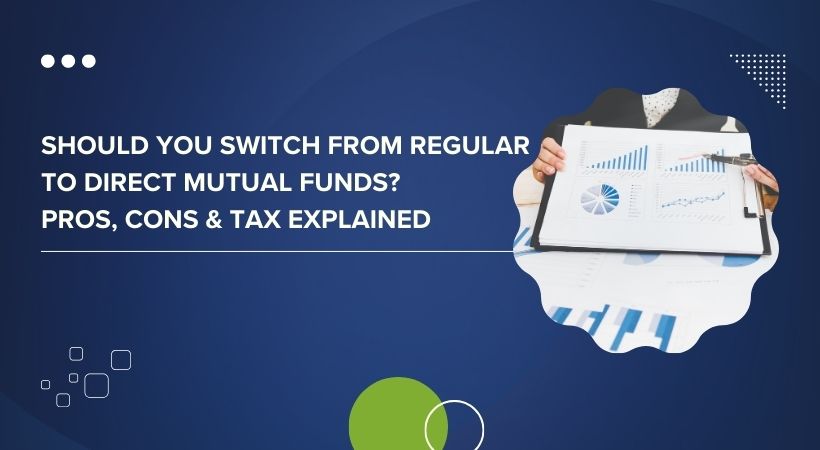The conversation around mutual funds has matured. Investors are no longer just asking “Which fund is best?” but also “Which type of plan is best—Regular or Direct?”
If you’ve been investing in regular mutual funds, you’ve likely heard about direct plans, which offer the same fund but with a lower expense ratio. The natural question then arises: Should I switch?
The answer isn’t a simple yes or no—it depends on factors like holding period, tax impact, and investment goals. Let’s break it down.
The Key Difference: Regular vs Direct Plans
- Regular Plan: Comes with an embedded distributor commission, resulting in higher expense ratios (often 1% to 1.5% more).
- Direct Plan: Bought directly from the AMC, without middlemen, offering lower expense ratios and higher long-term returns.
Though both plans invest in the same underlying assets, direct plans leave more returns in your hands because of reduced annual costs.
The Pros of Switching
- Higher Long-Term Returns
Lower expense ratios result in higher net returns over time. A difference of just 1% annually can mean lakhs in additional wealth over 15–20 years. - Transparency and Control
With direct plans, you know exactly what you’re investing in—no hidden commissions or biases. - Better Alignment with Long-Term Goals
Your money compounds more efficiently, helping you reach retirement or wealth-building targets faster.
The Cons (and When to Wait)
- Capital Gains Tax May Apply
Switching is treated as a redemption + new investment. If you’ve made profits:- Equity Funds:
- Short-term (less than 1 year): taxed at 15%
- Long-term (more than 1 year): taxed at 10% on gains above ₹1 lakh
- Short-term (less than 1 year): taxed at 15%
- Debt Funds:
- Short-term gains: taxed as per your income slab
- Long-term gains (if purchased before April 1, 2023): taxed at 20% with indexation
- Short-term gains: taxed as per your income slab
- Equity Funds:
- Exit Loads
Some funds charge an exit load (typically 1%) if redeemed within 12 months. - New Holding Period Starts
The new investment in the direct plan starts a fresh holding period for capital gains tax purposes.
When Switching Makes Sense
- You’re holding equity funds for more than 1 year and gains are within or just above the ₹1 lakh tax-free limit.
- The long-term savings in fees outweigh the short-term tax cost.
- You’re planning to stay invested for another 5–10 years or more.
- You have a large portfolio where even 1% savings can mean lakhs gained over time.
Let’s Do the Math
Let’s assume you invested ₹10 lakhs 5 years ago in a regular mutual fund, and it has now grown to ₹17 lakhs.
- If you switch, ₹7 lakhs is the gain.
- First ₹1 lakh of long-term gains is tax-free.
- Remaining ₹6 lakhs taxed at 10% = ₹60,000 tax.
But if your fund continues to grow at 11% net (direct plan) instead of 10% (regular) over the next 15 years, the additional return can be:
- Direct Plan Value (₹17L @11%): ₹83.1L
- Regular Plan Value (₹17L @10%): ₹73.5L
- Extra gain: ₹9.6 lakhs
So even after paying ₹60,000 in tax now, you still gain ₹9+ lakhs in the long run.
Conclusion
Switching from regular to direct mutual funds is a decision that combines financial insight with timing. Yes, there may be short-term tax and exit load implications—but the long-term benefits are often far greater.
Like any financial decision, switching should be guided by your investment horizon, current gains, and portfolio size.
Speak to your advisor or log in to your investment account to check if you’re in regular plans. Run the numbers on your holdings, and if the math works in your favor, consider switching to direct plans to make your wealth grow faster and smarter.
Author: Swapnil Kulkarni
Co-Founder, PriceBridge – A PMS of Ayan Analytics Pvt. Ltd.
Swapnil Kulkarni is a veteran in the wealth management industry, with 17+ years of experience. A CNBC TV18 Financial Advisor Award nominee (2010), he specializes in managed mutual fund strategies and focuses on investor education to help individuals make informed financial decisions.




